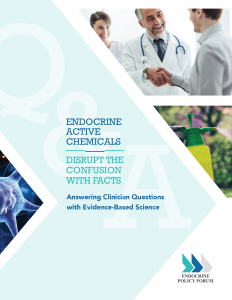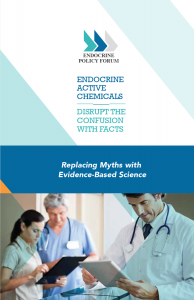Endocrine Disrupting Chemicals (EDCs) – A New Dialogue
The 2019 Endocrine Society Annual Conference and Expo (ENDO 2019) was an opportunity for clinicians around the world to learn about the latest science and regulatory discussions concerning endocrine active and endocrine disrupting chemicals (EDCs). Several members of the Endocrine Policy Forum (EPF), a consortium of academic and industry scientists and regulatory experts, were on hand to help answer common questions about EDCs and bring more clarity to some of the confusion and misperceptions about their alleged health effects.
For interested parties who were unable to attend ENDO 2019, we have highlighted several key questions below and provided links to free educational materials on EDCs.
COMMON QUESTIONS
By asking questions and engaging in dialogue, it can become easier to separate fact from fiction and make informed decisions about the safety of endocrine active and endocrine disrupting chemicals.
Is it possible that some chemicals have been mislabeled as “endocrine disruptors?”
Yes. “Endocrine active chemicals” are the substances that can “alter the function of the endocrine system.” They do not necessarily cause adverse health effects in humans or wildlife, but over time the public has started referring to them as “endocrine disruptors.” This is an inappropriate and often confusing misinterpretation and misuse of the WHO-IPCS definition.
Read moreCan safe levels of exposure exist for endocrine active chemicals?
Yes. Endocrine pharmacology and medical toxicology establish that safe levels of exposure exist for endocrine active chemicals, both natural and man-made. Some exposures to endocrine active chemicals will produce no response at all, while others may elicit transient (temporary) responses to which the body can naturally adjust and maintain its normal function.
Read moreIs there one authoritative list of endocrine disruptors that I can refer to?
No. Although some lists may appear to be based on definitive science, they typically do not meet the globally accepted WHO/IPCS definition of an EDC, employ the best available science, or consider factors like exposure or potency.
Read moreView more FAQs
FREE MATERIALS FOR CLINICIANS
Endocrine System
Organs & Glands
The endocrine system naturally responds to exposure from our environment, both chemical and physical. For example, a change in temperature, food or daylight can affect the level of hormones circulating in our body.


